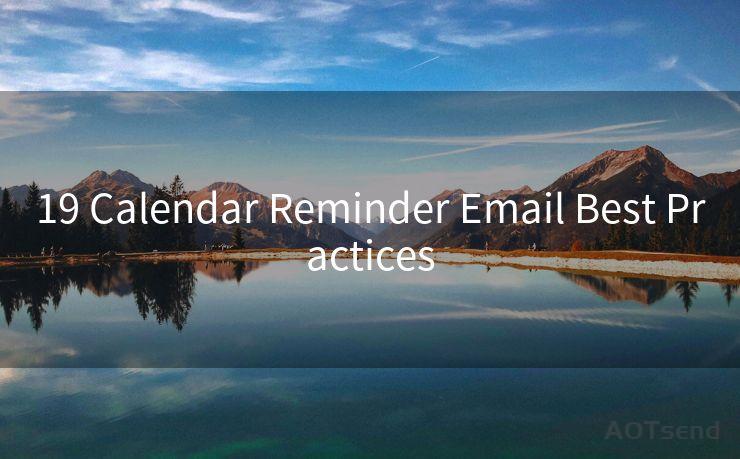19 Calendar Reminder Email Best Practices




When it comes to managing your calendar and sending reminder emails, there are several best practices that can help you be more effective and efficient. Here are 19 best practices for calendar reminder emails that will ensure you stay on top of your schedule and keep your recipients informed.
1. Clear and Concise Subject Lines
The subject line of your reminder email should be clear and to the point, summarizing the purpose of the email in a few words. For example, "Meeting Reminder: Project XYZ on January 15th."
2. Timely Delivery
Send reminder emails at least 24 hours before the event. This gives recipients enough time to prepare and adjust their schedules accordingly.
3. Personalize the Message
Use the recipient's name in the greeting and tailor the message to their specific role or responsibility related to the event. Personalization increases engagement and relevance.
4. Include All Relevant Details
Your reminder should include the date, time, location (if applicable), and any other pertinent information about the event.
5. Use an Appropriate Tone
Keep the tone of your email professional yet friendly. Avoid being too formal or too casual, aiming for a balance that respects the recipient's time while also conveying the importance of the reminder.
6. Provide an Agenda or Goals
If possible, include a brief agenda or list of goals for the meeting. This helps the recipient understand the purpose and expected outcomes.
🔔🔔🔔
【AOTsend Email API】:AOTsend is a Managed Email Service for sending transactional emails. Support Email Types: reminders, authentication, confirmations, notifications, verification codes, invoices, password resets, account activations, billing statements, two-factor authentication (2FA), and one-time passwords (OTP) emails, etc. $0.28 per 1000 Emails. 99% Delivery, 98% Inbox Rate.
You might be interested in:
Why did we start the AOTsend project, Brand Story?
What is a Managed Email API, How it Works?
Best 25+ Email Marketing Platforms (Authority,Keywords&Traffic Comparison)
Best 24+ Email Marketing Service (Price, Pros&Cons Comparison)
Email APIs vs SMTP: How they Works, Any Difference?
7. Attachments and Links
If there are relevant documents or resources, provide links or attachments. However, be mindful of file sizes and ensure compatibility with various devices.
8. Call to Action
Include a clear call to action, such as confirming attendance, preparing materials, or reviewing relevant information before the meeting.
9. RSVP Option
Provide a simple way for recipients to RSVP, whether through a link, email reply, or other means.
10. Format for Readability

Use bullet points, headings, and white space to make your email easy to scan and understand.
11. Test Email Compatibility
Ensure your email displays correctly on various email clients and devices. This helps avoid formatting issues that could confuse or mislead recipients.
12. Follow Up
Consider sending a follow-up email after the event, summarizing key points and decisions made.
13. Privacy Considerations
When sending to multiple recipients, use the "Bcc" field to protect everyone's email addresses.
14. Unsubscribe Option
If these reminders are part of a regular series, include an unsubscribe link for recipients who no longer wish to receive them.
15. Proofread and Spellcheck
Always proofread your emails before sending to avoid embarrassing typos or grammatical errors.
16. Template for Consistency
Create a template for your reminder emails to ensure consistency and save time.
17. Scheduling Tools
Consider using scheduling tools that automatically send reminders, reducing the need for manual emails.
18. Feedback Loop
Encourage feedback from recipients on the usefulness and clarity of your reminders.
19. Regular Updates
Periodically review and update your reminder practices based on feedback and results.
By following these 19 best practices for calendar reminder emails, you can ensure that your communications are clear, effective, and respectful of your recipients' time. Remember, the goal is to facilitate successful meetings and events, not create more work for your colleagues.




Scan the QR code to access on your mobile device.
Copyright notice: This article is published by AotSend. Reproduction requires attribution.
Article Link:https://www.mailwot.com/p6244.html



